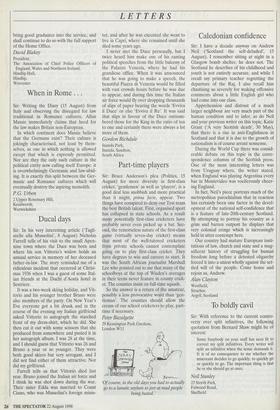Caledonian confidence
Sir: I have a decade anyway on Andrew Neil (`Scotland the self-deluded', 15 August). I remember sitting at night in a Glasgow bomb shelter, he does not. The Scotland he describes of his childhood and youth is not entirely accurate, and while I recall my primary teacher regretting the departure of the Raj, I also recall him chastising us severely for making offensive comments about a little English girl who had come into our class.
Apprehension and distrust of a much larger neighbour are very much part of the human condition and to infer, as do Neil and your previous writer on this topic, Katie Grant CA very Scottish death', 30 May), that there is a rise in anti-Englishness in Scotland and that it is due to the growth of nationalism is of course arrant nonsense.
During the World Cup there was consid- erable debate on this topic in the corre- spondence columns of the Scottish press. One of the most interesting letters was from Uruguay where, the writer stated, when England was playing Argentina every bar in Montevideo was vociferously cheer- ing England.
In fact, Neil's piece portrays much of the metropolitan parochialism that in reaction has certainly been one factor in the devel- opment of the national self-confidence that is a feature of late-20th-century Scotland. By attempting to portray his country as a grim and barren outpost he displays that very colonial cringe which is increasingly held in utter contempt here.
Our country had mature European insti- tutions of law, church and state and a mag- nificent history of struggling for human freedom long before a detested oligarchy forced it into a union wholly against the set- tled will of the people. Come home and rejoin us, Andrew.
Alan Clayton
Westfield, Strachur, Argyll, Scotland
























































 Previous page
Previous page